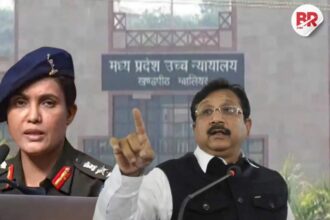
The political storm brewing in India has intensified, all thanks to a controversial document—often referred to as the “Judges List”—allegedly circulated by Assam Chief Minister Himanta Biswa Sarma.
The list, shrouded in mystery, has sparked a heated debate over judicial independence, with the Congress party accusing Sarma of politicizing the judiciary. Adding fuel to the fire, BJP MP Nishikant Dubey responded to the allegations in a unique way—with a “shayari,” or Urdu poetry.

What Is the “Judges List”?
At the heart of the controversy is a document that allegedly names judges with ties to the Congress party. While the exact contents of the list remain unclear, the accusations against Sarma are serious. Many believe this list is an attempt to undermine the impartiality of the judiciary. The implications are far-reaching, as the judiciary plays a crucial role in safeguarding democracy. Any perceived threats to its independence can erode public trust in the system.
This is not just a case of political mudslinging. It highlights deeper concerns about the relationship between the executive branch and the judiciary. Is this a political strategy, or is it an intentional effort to influence the courts?
Congress Takes a Stand
The Congress party wasted no time in expressing outrage. They have accused Sarma of trying to intimidate the judiciary and erode its independence. The party’s demands are clear: a full investigation into the origins of the list, accountability for Sarma, and the protection of judicial autonomy.
- Immediate Investigation: Congress is calling for an immediate probe into the creation and intentions behind the list.
- Sarma’s Accountability: They are holding Sarma accountable for any actions that could harm the judiciary’s credibility.
- Judicial Protection: Congress has promised to defend the judiciary from any political interference.
These demands reflect the party’s commitment to ensuring that the judiciary remains free from undue political influence. After all, a fair and impartial judicial system is essential for maintaining the rule of law in any democracy.
Also Read BJP Turns on Its Own MPs! Shocking Rejection of Controversial Comments on Supreme Court!
Nishikant Dubey’s Poetic Response
Amidst the political bickering, BJP MP Nishikant Dubey added an unexpected twist.
Instead of issuing a standard statement, he chose to express his support for Sarma in a poetic form—a “shayari.” This form of Urdu poetry, often used in India to convey complex emotions, added a layer of nuance and cultural richness to the debate.
Dubey’s shayari, though open to interpretation, seemed to defend Sarma’s actions while taking a subtle jab at the Congress party.
It’s an example of how politics in India is often not just about facts, but also about the emotions and symbolism behind the words. In this case, the poetry further complicated an already tangled narrative, offering a unique twist on the political discourse.
The Bigger Picture: Judicial Independence at Stake
Beyond the drama and poetic flair, the core issue at hand is the potential undermining of judicial independence. The judiciary’s role in maintaining checks and balances is vital to a functioning democracy. If the judiciary is seen as being under the influence of political parties, it risks losing the public’s trust.
In this context, Sarma’s alleged actions—whether intentional or not—raise important questions about the separation of powers.
The executive should not exert undue influence over the judiciary. Any attempts to do so can undermine the very foundation of democratic governance.
The controversy over the “Judges List” brings into sharp focus the delicate balance that must be maintained between politics and the judiciary. While political leaders may spar over such issues, the consequences for India’s legal system are much more serious. The nation must stand united in protecting judicial independence to ensure that the courts remain impartial and free from external pressure.
Also Read Mahua Moitra Criticizes BJP Over Nishikant Dubey’s Comments on Supreme Court












